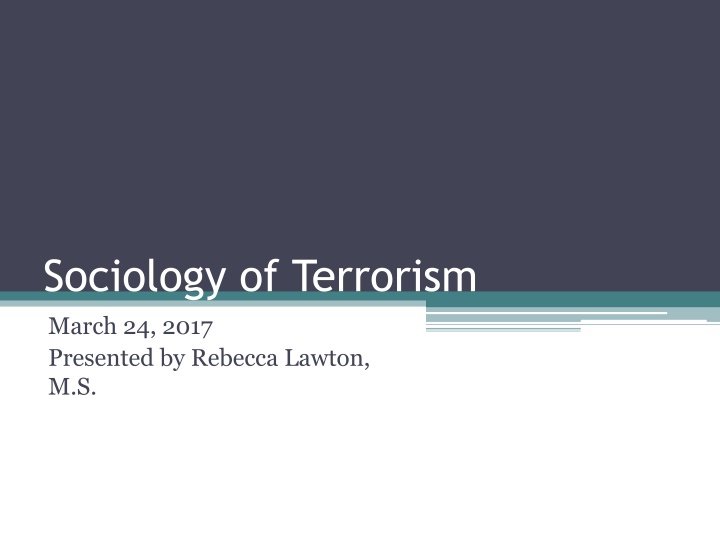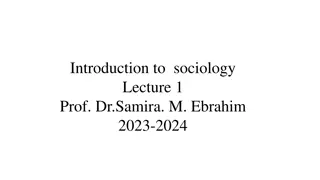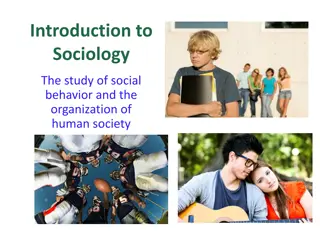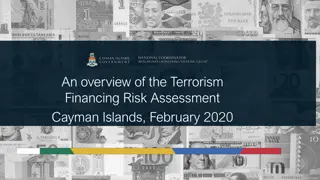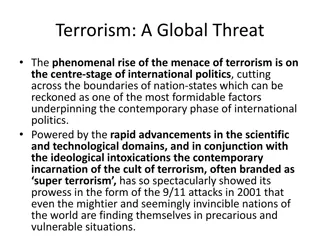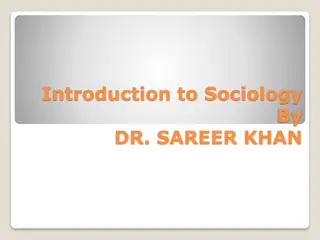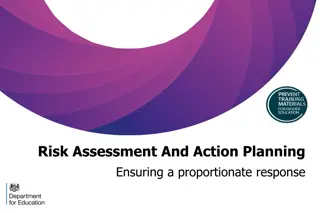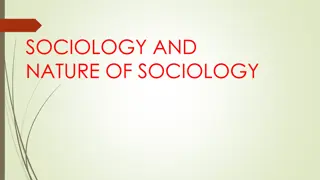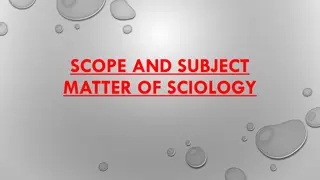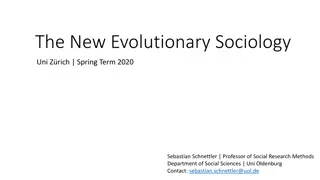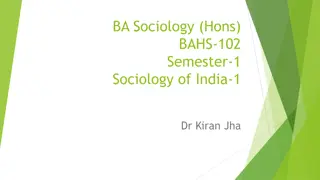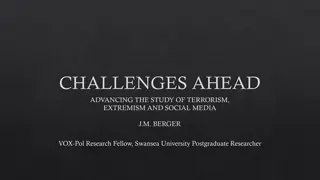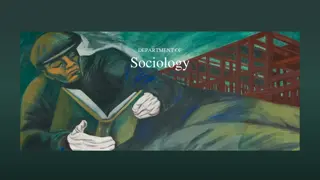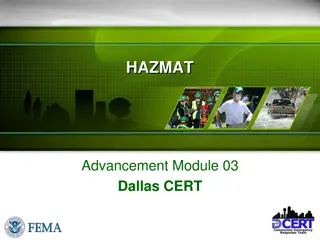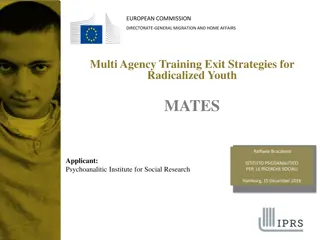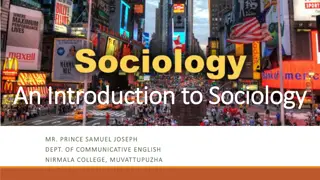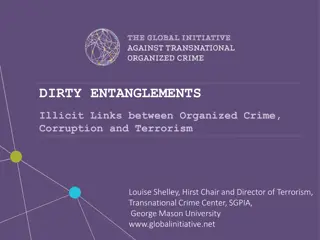Sociology of Terrorism: Understanding the Dynamics and Impacts
Delve into the intricate world of terrorism with a focus on analysis, identification, and stages leading to radical actions. Explore the social, political, and historical context behind terrorism, emphasizing the importance of understanding individual perpetrators. Uncover the complexities of justifications, motives, and societal perceptions associated with acts of terror.
Download Presentation

Please find below an Image/Link to download the presentation.
The content on the website is provided AS IS for your information and personal use only. It may not be sold, licensed, or shared on other websites without obtaining consent from the author.If you encounter any issues during the download, it is possible that the publisher has removed the file from their server.
You are allowed to download the files provided on this website for personal or commercial use, subject to the condition that they are used lawfully. All files are the property of their respective owners.
The content on the website is provided AS IS for your information and personal use only. It may not be sold, licensed, or shared on other websites without obtaining consent from the author.
E N D
Presentation Transcript
Sociology of Terrorism March 24, 2017 Presented by Rebecca Lawton, M.S.
While nothing is easier than to denounce the evildoer, nothing is more difficult than to understand them. --Dostoevsky
Terrorism and the US Incidents before 9/11 Terror since 9/11 Reactive nature Difficulty of compilation and analysis of intel Look to outside for sources of hostility Unsure of enemy Focus on religious extremism
Terrorism Analysis Top-down vs. bottom-up Justification Justifiable when aimed at bad people Dehumanization Crazies, criminals, crusader Crazies emotionally disturbed individuals Criminals perform acts for personal gain Crusaders prestige and power
Terrorism Defined unlawful use of force or violence against person and property to intimidate or coerce a government, the civilian population or any segment thereof, in furtherance of political or social objectives. (FBI) May publicize, dramatize, and further political and religiously motivated and justified political and social agendas
Who? What? Social Construction Perception Terrorism as Political Violence Relative affluence History of colonialist exploitation Terrorism as Communication Media may determine legitimacy Socializing Terrorists Acceptance of actions Exposure=commitment
Stages leading to Terrorism Crisis of confidence Conflict of legitimization Crisis of legitimacy Grievances turn into intense hate of the enemy dehumanization once an enemy had been declared and made into the absolute moral evil, the world became simple, and any means were justified for fighting this evil
Understanding the individual who commits terrorism is vital, not only for humanitarian reasons but also to decide how best to deal with those individuals while they are engaged in planning or carrying out terrorist acts. -- Combs
Terrorist Mindset May sway how they interpret and respond to situations Can be drivers and products of psychological propensities May increase receptivity to extremist ideology or justification for violence May not cause terrorism Can create or enable vulnerabilities and propensities for affiliation
Worldview Affect Mindset Authoritarian Submission to authority Staunch conventionalism Anger and aggression towards out-groups Dogmatism Affect person s appraisal of injustice Closed cognitive system of beliefs about reality Apocalyticism Belief in approaching confrontation or cataclysmic event Threaten populace and encourage people to take up arms against enemy
Fundamentalism Five primary characteristics Dualistic thinking tendency to form absolutist ideas about the nature of right and wrong and how people and events fall into one category or the other Paranoia group context. Extreme and unwarranted suspiciousness associated with hypersensitivity to humiliation and other threats to self-esteem Apocalyptic orientation narrative of personal and global history Relationship with charismatic leadership group centers on a leader with a powerful presence, who is often paranoid, but shows complete self-assurance and intense conviction of his or her ideas Totalized conversion experience new self forms and the old is discarded as despised
Changing face of Terror Previously seen as external enemy Religious motivation Small scale and outside US Attack military installations Increase in domestic terrorism Changing American population Mass media and social media
Analyzing the Terrorist Psychological Vulnerabilities
Understanding Vulnerability Factors point to some having a greater openness to increased engagement Makes them more vulnerable than others to engaging in terrorism Situational and contextual factors affect whether and how psychological characteristics or propensities manifest
Need for Meaning/Identity Quest for meaning is driven by four needs Sense of purpose comes from believing that one s actions and activities make a difference and affect the outcomes of future events Efficacy feelings of efficacy comes from ones sense of control over the basic directions and outcomes of one s life Value a sense of value comes from a belief that one s actions are good or correct in a moral sense Self-worth self-worth comes from a sense that the person is fundamentally good and possesses desirable characteristics Fulfilling these needs is a foundation for a sense of personal identity a stable sense of who one is and one s values in key domains People gravitate toward an existing, structured set of beliefs and adopt them with little critical thought or personal reflection Extremist ideology is often attractive to those who feel overwhelmed by the complexity and stress of finding meaning
Need for Belonging Quest for meaning needs sense of belonging If a person has been rejected or excluded more likely to endorse ideas about the futility of, and lack of meaning in life Creates a psychological vulnerability to exploitation Social process Initial attraction is often to the group, or community of believers, rather than to an abstract ideology or to violence
Perceptions of Injustice or Humiliation Perceived injustice and humiliation as central factors in understanding violence generally and terrorism specifically Three features of injustice as accelerator People are naturally included to view injustice as an intentional act just world people get what they deserve and deserve what they get If people find themselves a victim of injustice, then they assume someone else is at fault for that condition Attributing blame, now has a target Ways in which people process social information largely drives the clarity and strength of injustice sentiments
Power of Perception Power comes from sensitivity to detecting injustices how much that person rehearses, ruminates and fuels them Perceptions of injustice can prompt powerful, moral emotions that potentiate a drive to punish the offender Particularly moral outrage Moral emotions can mobilize and drive a strong and sometimes irrational desire to punish the wrongdoer
Motivational Propensities Needs, wants, interests and desires Approach-avoidance dynamic Push/pull factors Motivational clusters Status-related Identity-related Thrill-related Revenge-related Material-related
Attributional Propensities Explanations people generate regarding causes of positive and negative events in their lives Attribute causes to themselves, to others or to situational factors Grievances often push a person toward terrorism Biases Externalizing Personalizing Hostile Attribution Confirmation
Volitional Propensities Nature and degree of control that persons have to achieve functional goals Involve implementing intentions Tied to self-concept and identity Symbolic self completion theory Deficits in volitional competence
Attitudinal Propensities Comprises a person s internal appraisals that predispose them to respond favorably or unfavorably Proviolence attitudes Grievances External threat Sensation-seeking Disinhibition=low capacity for empathy Low-restraint or self-control
Sociological Perspectives Sociological theories emphasize factors influencing the behavior of an entire group
Relative Deprivation Theory Develop high expectations and aspirations and hopes for upward mobility Frustrated achievers Absence of opportunities to meet heightened expectations Geographic proximity to Europe Wealthy Middle Eastern countries
Effects of Globalization Proposed that economic disparities cause terrorism Dissastisfaction with one s situation comes from applying subjective standards A feeling of injustice that would not have been evoked had they not made the comparison Rebellions occur when people cannot bear the misery of their status Sociological link between poverty and terrorism Increasing differences between the material welfare have provoked a new era of political violence Accelerated globalization and the news media facilitates communication between globalization s victims Hamas and Hezbollah
Social Identity Theory Suggests that the identity of individuals who engage in terrorism derives from three different sources personal, social and group/collective Explains roles of individuals within the organizations, as well as the role of the organizations within the culture
Social Learning Theory Suggests that violence follows observation and imitation of an aggressive model Explain terrorist behaviors not as the consequence of innate aggressivity but of cognitive reconstrual of moral imperatives Learn from culture s public glorification of terrorists Acceptability of terrorist violence takes didactic form madrasas
Frustration-Aggression Hypothesis Violence as a result of a real or imagined underprivileged, disadvantaged status and an aggressive response arising from a failure to have their grievances resolved Includes a gap between rising expectations and need satisfaction Terrorist behavior as a response to the frustration of various political, economic and personal needs or objectives Final expression of the terrorist impulse to desperation in the face of oppression Violence is always a response to frustration (Davies)
Oppression Theory Oppression provokes political violence Actors often cite the injustice of their treatment by governments that rob them of identity, dignity, security, and freedom as the motive for their joining a terrorist group Perceived oppression
National-Cultural Theory Terrorism expresses itself different in collectivist versus individualist cultures Collectivist cultures--a person s identity is primarily derived from the social system Dividing the world strictly according to in-groups and out- groups and linking their personal well-being to the well- being of their group Individualist cultures identity is derived from personal goals Collectivist more likely to carry out terrorist attacks on out-groups including foreigners 3rdworld countries Individualist less inhibited in attacking one of their own
Religion and Terrorism Religiously Motivated Terrorism Divine duty of believer Unconstrained by political, moral or practical Religious vs. secular terrorism Apocalyptic most dangerous Sacrifice to reach objective Religious Identity Cognitive and emotional value of membership Social functions Religious Extremism Perceive threat to religion
Fundamentalism From Fundamentalism to Radicalization Insistence that the faith represents the sole absolute truth Tenet that its believers have been chosen by a supreme being Conviction that divinely inspired religious law outranks secular law Stages of Fundamentalism Passive Assertive Impositional
Islam and Terrorism Main components of current religious crisis Failure to thrive on its on terms Loss of connection to the global mainstream Fundamentalist Reject democratic values and contemporary Western culture Modernist Want the Islamic world to become part of global modernity Secularist Believe that religious customs must be in conformity with the law of the land and human rights Traditionalist Suspicious of modernity, innovation and change
21stCentury Education New era of terrorism
Terrorism Investigations Evaluate how we discern Recognize potential enemy before attack committed Example visas Attempt to educate population and law enforcement Reduce hostility in our country and outside Prepare for inevitability Respond, Repair and Rebuild
